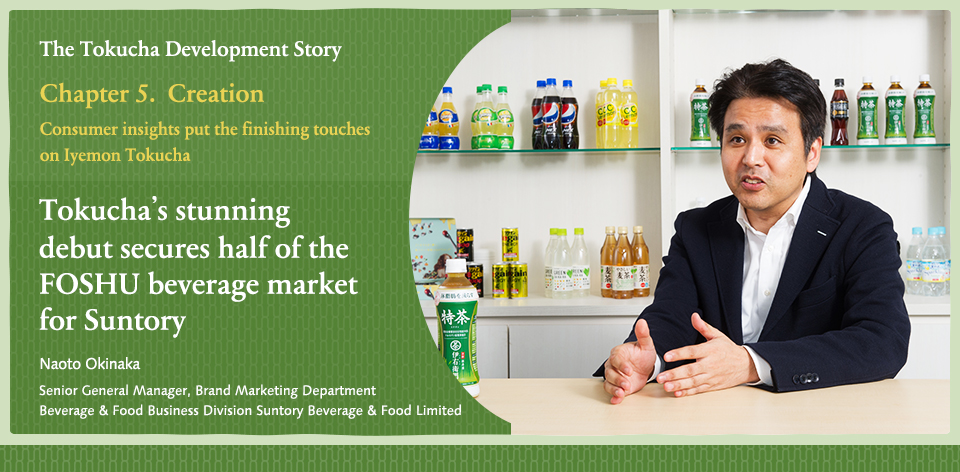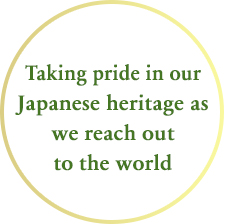- Suntory Global Innovation Center
- > Research & Technology
- > The Tokucha Development Story
- > Chapter 5. Consumer insights put the finishing touches on Iyemon Tokucha
Research & Technology

I was put in charge of FOSHU products in 2010. At that time, we actually weren’t looking to make a green tea product with quercetin glycosides, but were instead moving towards the development of a functional beverage packaged in a 350-ml PET bottle. We had already put our FOSHU application in.
Although the health claims of our new beverage were attractive, it seemed somewhat of a waste to put this exceptional ingredient in a functional beverage. My gut told me that we would do better making a green tea in the same line as our core Iyemon brand. When I suggested this, the people around me looked at me as if I were speaking gibberish! It seemed I had really thrown a wrench in the gears with this unthinkable suggestion.
The Iyemon brand strives to portray an authentic image, represented by the Iyemon-han character played by Masahiro Motoki. There were a good number of people who felt that we risked destroying that image if we put quercetin glycosides in Iyemon and sold it as a FOSHU product. But since I was in charge of developing the Iyemon brand, I was the very person who had built that image to begin with—and that probably made my audacious suggestion a bit more palatable.
There are so many people in the world concerned about body fat, and I was sure that they would be delighted to get an effective body fat-reducing FOSHU product with the delicious, familiar taste of green tea. Also, since everyone already knew the Iyemon brand, and were used to the 500-ml PET bottle, they would feel confident drinking it. I was sure of it.
Before we say that something is going to destroy a brand image, we need to consider who the brand is really meant for. We originally design a brand to be something worthwhile for our customers—but before we know it, we start thinking it’s something for ourselves and don’t update the image for selfish reasons. No matter how popular a brand is, the principle of evolution tells us that it has to keep pace with the changing world around it or it will die out. Trying to protect a brand as a matter of pride is a recipe for extinction.
Fukujuen is a Japanese tea company with a rich tradition, but they also recognize the importance of innovation and agreed to help us with our marketing plan. We had already built a trusting relationship with them, and we were helped by the fact that adding quercetin glycosides didn’t affect taste. I think that if adding it were to have significantly changed the flavor, we would have decided against it. When we applied for FOSHU certification for our functional beverage, we passed in terms of the functionality and safety of quercetin glycosides, so when we shifted to Iyemon Tokucha, we moved straight to the human studies. We filed the Tokucha application in 2010, but if we include the previous development period for our functional beverage, the time it took to launch the product in 2013 actually comes to seven years.

It’s common for companies to get stuck thinking about their own interests when it comes to products, refusing to change course once they’ve started down a given path. But the future never unfolds exactly the way you thought it would seven years ago. Trying to barrel ahead with the same exact plan is futile. With the market changing so drastically, only those companies that have the flexibility to change course partway through are going to survive.
The fact that we succeeded in pulling off such a major shift from functional beverage to green tea has everything to do with the Suntory culture, where passionate employees can speak their minds and initiate change, and where flexibility is permitted in the course of product development.
So we dared to shelve a functional beverage it had already gotten approved and put all of our efforts into Tokucha—and the result was tremendous success in capturing a full 50% of the FOSHU beverage market.
When submitting a FOSHU application, you have to decide on things like the product design and product name beforehand. FOSHU stands for “Food for Specified Health Uses,” so we took the first character in the Japanese word for “specified” (tokutei), read “toku,” and added it to the character for “tea” (cha) to get the name “tokucha.” For the design, we wrote this straightforward product name across the bottle along with the phrase “reduces body fat” in large letters in order to create impact and make its function clear to people from all walks of life who are concerned about excess weight. Under that, we wrote the character for “tea” in a circle and the name Iyemon, to indicate the lineage of the product. This tells consumers that they are drinking a special Iyemon tea from renowned Kyoto tea merchants Fukujuen.
Naturally, the purpose of product design is to communicate everything consumers need to know about the product. Our customers lead busy lives, so we wanted them to know what Tokucha was all about even if they had never seen our advertising—or at least learn everything they needed to know so that they could get a better understanding of the product once they saw the ads.
The typical size for a FOSHU tea is 350 ml, but that’s really no more than an empty corporate tradition. It was better to give people a delicious tea in the 500-ml size they drink every day. We wanted something that was good for the body, but that also tasted great—a principle that has been handed down intact from our founder Shinjiro Torii. Though our initial approach to Tokucha was a scientific one, ultimately the most important thing was coming up with a delicious beverage recipe that people would reach for time and again.
The members of our product development team in charge of getting the Iyemon recipe just right worked long and hard to come up with a formula that exhibited the distinctive qualities of Iyemon tea: fragrant, crisp, and refreshing enough to drink day after day.


I think there are two main reasons why Tokucha ended up being such a hit product. The first has to do with our research and development team—particularly the people working on the research side. They put a staggering number of hours into coming up with an ingredient that would do some good in the world, and then proving scientifically that the product was both effective and safe. The second reason was our ability to take those major research findings and leverage the Iyemon brand so that they would successfully translate into an approachable product with broad appeal.
It doesn’t matter how good the ingredient you develop is—if your marketing team can’t convert it into a product that customers want, it can’t be of any benefit to people. And no matter how talented your marketing team is, if you don’t have skilled researchers and developers in your R&D department, you can’t reliably extend your value chain all the way to end users.
Research and development teams communicate through science, so their messages are necessarily complex. It’s critical to be able to translate those messages into something clear and to the point that buyers can understand in an instant. The question is how to add an approachable charm to something based on science. Of course, in this business, whether customers fall in love with your product depends on whether you manage to bring together solid research and emotional appeal. This “charm” aspect is something that our founder Shinjiro Torii built into Suntory’s corporate culture from the beginning.
We are incredibly fortunate that Tokucha has become such a huge hit—but as they say, good luck comes to those who work hard. I consider our success a result of our tireless efforts.
Now, we’re hoping to build on our success by widening our perspective to include the global obesity problem. We’ve gotten to a point where even the Japanese—known for having one of the world’s healthiest diets—are struggling with excess body fat. If we turn to the wider world, we find huge numbers of people battling obesity at a level so severe, our problems in Japan are nothing by comparison.
Food and beverage products that are both appealing and backed by scientific evidence have the potential to fill all kinds of market needs across the globe, and Suntory is already in possession of these products. This inspires me to take pride in my company and my culture; in short, it makes me proud to be Japanese.
If we look at things from a global perspective, Japan is nothing more than a group of tiny islands tucked away in the far eastern corner of the world. But our little archipelago is blessed with such natural beauty, such beautiful seasons, such delectable cuisine—not to mention innovative technology backed by exacting science. I want us to take pride in our heritage—be proud to be Japanese—as we go out and offer the world a product that can truly help people suffering from obesity everywhere.


* The department name, title, and photo are as of the time of the production (interview).
* The department name, title, and photo are as of the time of the production (interview).













